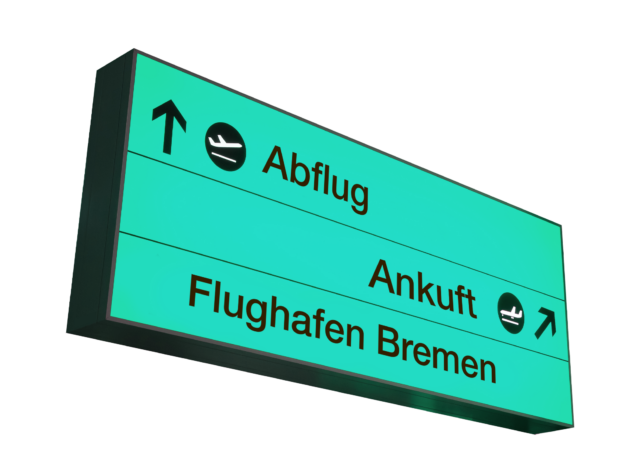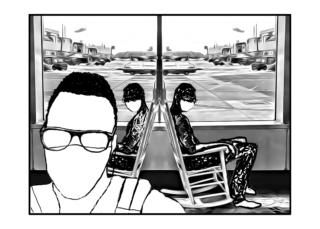
Is there anything stranger than an airport? In our Airport Code series, writers pick a travel hub to unravel.
I’ve lived abroad for almost fifteen years, but getting on the plane home never loses the sensation of time travel. Despite all that has changed in and around my hometown — the neighbors and pets that have died, the new cars and house improvements, the grey hair on my father’s head — it will always contain a certain version of me and my life. I return to objects that wouldn’t fit my existence as a foreigner abroad, to conversations and activities I miss and loathe in equal measure.
The closest airport to my hometown belongs to the city of Bremen in the north of Germany. Bremen boasts the shortest distance between airport and city center in the whole of Europe. The terminals are just small enough that I reliably run into people I went to school with, or acquaintances, including a former colleague who would always greet me with the same laconic phrase: “Yes, I’ve been visiting the same aunt.” His trip with the time machine seeming always a little less voluntary than mine. His aunt taking on mysterious shapes in my mind, a glimpse of his other life, otherwise carefully hidden from view. A strange moment of intimacy in a place where it’s usually impossible to leave a personal trace, since airports contain the most used and most wiped surfaces. Places we share without leaving anything behind.
The city of Bremen has a reputation for being left-wing and, at least in recent years, for being broke. In sync with these credentials, the airport makes it rather difficult to feel glamorous. As a low-cost airline customer, I am sent to a separate hall after security. A hall that for the past fifteen years has felt empty and unfinished, a cheap warehouse built without anyone’s comfort in mind. Where everybody is made to feel like they could only afford £9.99 for their ticket and the seating arrangement is not unlike one of those children’s games where one child will always be left without a chair. Except that in the end there is no winner. It’s curious how this urge to highlight social differences emerges at airports and on airplanes. People are made to pay very different sums to be on the same claustrophobic cylinder, and it seems the most normal thing in the world to be separated into first and second class. Little curtains are drawn and doors to lounges are only open to some. A free newspaper can mark the difference between rich and not so rich.
Inside the budget terminal, the kiosk where I buy my water is still run by the same grumpy German woman who looks like she narrowly escaped an eighties crime show, and whose only rival is a bar that sells very questionable baked goods, croissants with their ends dipped in chocolate, and of course alcohol, which keeps the endless groups of stag-dos entertained. This absence of glamor and commercial stimuli is never more painful than when your flight is delayed, or if you have really upset the gods, canceled. A reminder that travel is a two-headed beast — a source of pleasure that can make you feel like the world is made of functioning systems, like a good body that doesn’t bother you with pains and ailments, or a source of anxiety and regret when home suddenly feels very far away and you curse every choice you ever made. When you find yourself sleeping on benches, ready to kill for a hot shower and a toothbrush.
On one of those occasions when our flight was finally canceled after a drawn-out ritual of hope and delays, I found myself in a crowd of stranded travelers. I spotted a former classmate of mine. Anna was now also based in London, but stuck in the vortex of the time machine, we found ourselves glued to our teenage resentments. The years that had passed suddenly disappeared, since former classmates don’t age like normal people but always look like they’re stuck in jaded teenage bodies. After a few words, she vanished, leaving me in the company of a man who insisted that we could cut costs by sharing a hotel room, proving that our reactions to despair tend to be quite basic.
Not feeling like the modern equivalent of a bunker fuck and not having a small child to hold the airline to ransom with and insist on a hotel room, I rang my mother. Assuming the identity of the desperate teenager that Anna’s sudden appearance had transformed me into, I woke her up. And since I was stranded, pathetic, and being pursued by a dodgy man, she had no choice but to climb out of bed and drive the sixty kilometers to pick up her child. I stepped outside, secretly reveling in that feeling of waiting for a parent’s car, for the headlights to appear, and for the nightmare to be over. That sweet mix of guilt and being absolved of all responsibilities. Of feeling protected and for a moment free from life’s burdens. And I was suddenly grateful to the airport of Bremen with its ugly hall for cheap people like me. For holding on to a version of myself that I could so easily have forgotten about.


